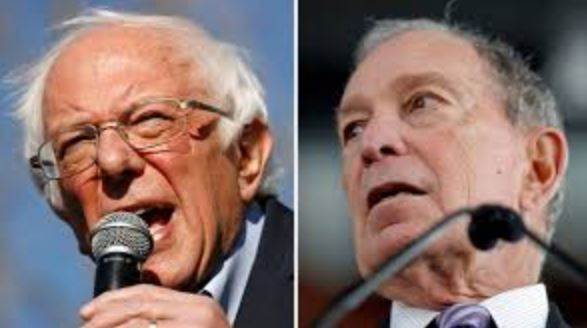Search here

20-Feb-2020
Decoding The Sanders-Bloomberg Struggle
Playing text to speech
The Bloomberg-Bernie
struggle is sort of like a comedian ebook come to existence. The two warring parties cover almost every cliché on the proper-wing scorecard.
The following year, he got married and left the party after today for an aggregate fact-locating ride and honeymoon within the Soviet Union. When he came back, he sounded a bit like Lincoln Steffens, the well-known journalist who'd stated of us, "I have seen the future and it really works." In Steffens' protection, he visited in 1919, years after its founding and earlier than most of the inconvenient mass homicide and hunger. Sanders's notion the Soviet Union turned into destiny 3 years earlier than it collapsed.
Of direction, this is not why the maximum of Sanders' fanatics like him. He was on the right side of the civil rights movement while it genuinely mattered. He's been a consistent propose of what he calls democratic socialism here at the democratic party. And he's an unreconstructed enemy of the financial elites, especially the hated "billionaire elegance."
READ HERE MORE : Phubbing Is The Relationship Killer
Which brings us to Michael Bloomberg, who sits atop the 1 percentage of Sander's hit list. Bloomberg is a perfect stand-in for a completely unique sort of liberalism, one that does not even like to call itself liberal. He headlined the release of No Labels, an organization dedicated to getting ideology out of politics. A lifelong Democrat, Bloomberg switched labels to come to be a Republican to run for mayor in 2001. By the end of his term, he became independent. Now he's a Democrat due to the fact he's running for president.
As mayor of New York, he turned into a poster boy for a form of smug progressive-publish-partisan technocratic government that prizes statistics over feelings.
The information confirmed that political obesity values the health-care system cash, and when you consider that sugary sodas contributed to obesity, Bloomberg clamped down on them.
The records showed that young black men committed most of the gun homicides, so Bloomberg clamped down on them with stop and frisk.
This isn't always why his lovers like him. For the long term, he turned into an icon of the credentialed higher magnificence who saw an ideological way of life-conflict fights as a lot boob bait.
More recently, he's come to be the liberals' "Chicago way" reaction to Trump. If the right comes at you with a billionaire could-be Putin, you come back with a bigger billionaire might-be Lee Kuan Yew.
Both guys represent strands of liberalism with very long pedigrees. Sanders can hint his lineage again to antiwar socialists and populists together with William Jennings Bryan and Eugene Debs, in addition to reformers including Jane Addams. Bloomberg's antecedents can be found in democracy-skeptical "disinterested" innovative pragmatists which include Walter Lippmann, Oliver Wendell Holmes, and the "Wisconsin School" economists. Usually, those strands intertwine and overlap.
Barack Obama had a foot in both camps; he turned into each the anointed chief of a mass movement and the overseer of the Affordable Care Act, with all of its facts-pushed rationings.)
But when stripped to their purest factors, one camp is all approximately harmony and people energy, and the other is set technocratic understanding.
Like Trump, each guy is beneficiaries of our hollowed-out political parties, which might be incapable of performing the gatekeeper feature of the nomination procedure.
And that raises the stakes of their contest. Trump has transformed a good deal of the GOP in his photograph. Too vulnerable to shield their own emblem, the Republicans have adopted his.
If either Sanders or Bloomberg wins the nomination, it is going to be thrilling to look if the same element occurs to Democrats. If it's Sanders, will they come to be a populist birthday party of Social Democrats? If it's Bloomberg, will the Democrats emerge as the celebration of bureaucratic authoritarianism?
Again, Democratic politicians usually straddle these tendencies. There are, of course, different alternatives for the primary electorate. But the choice between these is two is not easy but rather complex, and if either guy wins, the Democratic Party could end up creating a preference as a way to outline it as a great deal as Trump has come to define the GOP.

Comments
Solutions
Join Our Newsletter
Subscribe to our newsletter to receive emails about new views posts, releases and updates.
Copyright 2010 - 2024 MindStick Software Pvt. Ltd. All Rights Reserved Privacy Policy | Terms & Conditions